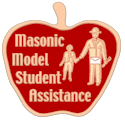National Masonic Foundation for Children
"Healing Crippled Hearts"
The National Masonic Foundation For Children is a non-profit, charitable organization supported by Masonic Grand Lodges and allied Masonic organizations created to establish programs, particularly "Masonic Model" Student Assistance Training programs in schools, which will help youth lead productive, useful, and healthy lives.
The Foundation builds on Freemasonry's centuries-old tradition of helping the most vulnerable in our society. Today, more than ever, children need help in becoming responsible adults as they face countless challenges: broken homes, patterns of substance abuse in families, and a complex world with many traditional nurturing institutions shaken. Freemasons are sensitive to the fundamental belief that children are our future. We cannot neglect the needs of today's children if we expect them to grow up to be happy, healthy, productive stewards of our future.
Every year addiction claims younger victims. And there are the tragedies associated with addiction, such as suicide (a leading cause of death among adolescents), pregnancy (more than a million teenage girls become pregnant each year), violence, physical and sexual child abuse, homicide, depression, tragedy on the highways, mental and physical illness, birth defects, and on and on. Everyone is being called on to help confront these addiction-associated tragedies and the Foundation is Freemasonry's contribution to this vital effort. In 1987, the Foundation opened its offices near the White House in Washington, DC and works through and with individual Grand Lodges to establish substance abuse programs designed to reach young people. In certain circumstances, the Foundation also works with state government and education officials, prevention professionals, health systems, and the general public to help foster addiction prevention activities.
The Foundation's long-term goals involve organizing prevention programs in all 50 States, and Canada and Europe, and to communicating the success of these programs. By publicizing the positive results, the Foundation hopes to stimulate further community action.
The "Masonic Model" Student Assistance Training programs originated in the early 1980's. "Masonic Model" programs train a core group of five to seven educators (administrators, teachers, school nurses, guidance counselors, etc.) from an individual school in how to identify those children most likely to succumb to addiction and in how to successfully intervene to help these young people. The intensive training, which usually lasts from three to five days, involves practice sessions designed to simulate real events, along with presentations on such subjects as "Characteristics of an Addictive Family, "Pharmacological Effects of Drugs," "Creating a Crisis Response Team," etc.
Experience with schools with "Masonic Model" trained teams in place shows that most children who are identified as potentially at-risk, or who are in the early stages of addiction, can be successfully steered away from the addictive cycle. The prevention approach works. Freemasons contribute in a number of ways. Grand Lodges may provide initial organizational and community guidance, or financial support and materials. Individual Lodges may supply meeting space, help with food or meeting materials, or volunteer help. In many cases, Lodges have acted as sponsor for a nearby school building with positive results ultimately extending throughout the entire community. It has been shown time and again that Freemasons can also provide a positive presence and a motivating influence on group activities. With Masonic Lodges (over 13,000) located in virtually every community or region in the United States, Freemasons are uniquely positioned to have a dramatic impact on improving the lives of our nation's young people.
As a result of its efforts, the Foundation is establishing a national identification for Freemasonry on the subject of adolescent drug and alcohol abuse. Yet another example of our 'Caring Concern'.
![]()


